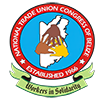The National Trade Union Congress of Belize (NTUCB) is a Federation or Association of
Trade Unions registered and operating within the country of Belize who subscribe to the
principles and philosophy of free and democratic forms of unionism and government.
The NTUCB was first formed and organized on Monday July 11, 1966 at a meeting held at
Riverside Hall in Belize City. At that time, three unions – the Public Officers’ Union (POU)
now PSU headed by President Edney Cain, the British Honduras Union of Teachers (BHUT)
(then only non-Catholic teachers, now BNTU) headed by the then President Alvan Cadle
and the General Workers’ Development Union (GWDU) – Belize Branch President Steve
Longsworth signed the documents giving birth and legality to the NTUCB.

